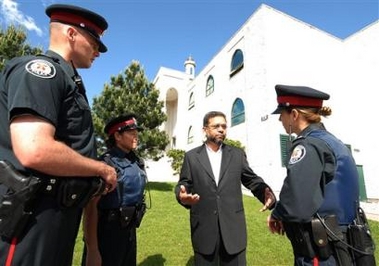Police said Monday more arrests are likely in an alleged plot to bomb
buildings in Canada, while intelligence officers sought ties between the 17
suspects and Islamic terror cells in the United States and five other nations.

Mohammad Alam,
President of the Toronto Islamic Foundation, speaks to police outside the
Foundation's centre in Toronto, on Sunday, June 4, 2006, following a press
conference. [AP] |
A court said authorities had charged all 12 adults arrested over the weekend
with participating in a terrorist group. Other charges included importing
weapons and planning a bombing. The charges against five minors were not made
public.
The Parliament of Canada, in Ottawa, is believed to be among targets the
group discussed. Toronto Mayor David Miller said CN Tower, a downtown landmark,
and the city's subway were not targets as had been the speculated in local
media, but declined to identify sites that were.
A Muslim prayer leader who knew the oldest suspect, 43-year-old Qayyum Abdul
Jamal, told The Associated Press on Monday that Jamal's sermons at a storefront
mosque were "filled with hate" against Canada.
Authorities said more arrests were expected, possibly this week, as police
pursue leads about a group that they say was inspired by the violent ideology of
the al-Qaida terror network.
"We've by no means finished this investigation," Mike McDonell, deputy
commissioner for the Royal Canadian Mounted Police, told AP. "In fact, you might
look at it that, really, we're just starting with the arrests. We have a
responsibility to follow every lead."
Although both Canadian and U.S. officials said over the weekend there was no
indication the purported terror group had targets outside Ontario, McDonell told
AP on Monday that there are "foreign connections," but he would not elaborate.
In Washington, a spokesman for the National Security Council at the White
House, said President Bush spoke with Canadian Prime Minister Stephen Harper
about the case Monday afternoon, but gave no specifics of what was discussed.
"Prime Minister Harper called the president to update him on the situation
involving the arrest of 17 individuals in Toronto who are charged with
terrorism-related offenses," spokesman Frederick Jones said.
A U.S. law enforcement official said investigators were looking for
connections between those detained in Canada and suspected Islamic militants
held in the United States, Britain, Bangladesh, Bosnia, Denmark and Sweden.
American authorities have established that two men from Georgia who were
charged this year in a terrorism case had been in contact with some of the
Canadian suspects via computer, the official said, speaking on condition of
anonymity because the investigation is continuing.
Prosecutors have said the Georgia men, Ehsanul Islam Sadequee and Syed Haris
Ahmed, traveled to Washington to shoot "casing videos" of the Capitol and other
potential targets.
Sadequee, 19, a U.S. citizen who grew up near Atlanta, is accused of lying to
federal authorities during an FBI terrorism investigation. Ahmed, 21, a Georgia
Tech student, faces a charge he provided material support and resources for
terrorism.
In Atlanta, Ahmed's lawyer, Jack Martin, told AP there may have been some
connection between his client and the suspects, but he insisted it wasn't part
of any terrorism plot.
"Other than having the possibility that they may have met at some point, I
know of no indication that anyone believes my client had anything to do with
what these guys were up to," Martin said.
A U.S. counterterrorism official said the 17 suspects in Canada are an
example of a type of group that authorities have been concerned about for some
time: self-organized, ad hoc cells of homegrown extremists, a development first
seen in Britain.
The official, also speaking on condition of anonymity, said Canada's
government rightfully considered the 17 a serious threat because there was
evidence the group was far along in planning attacks.